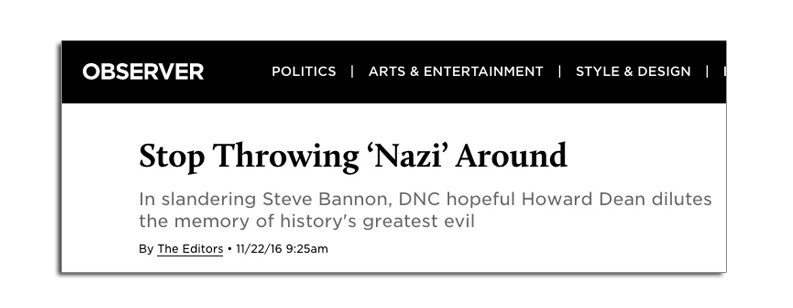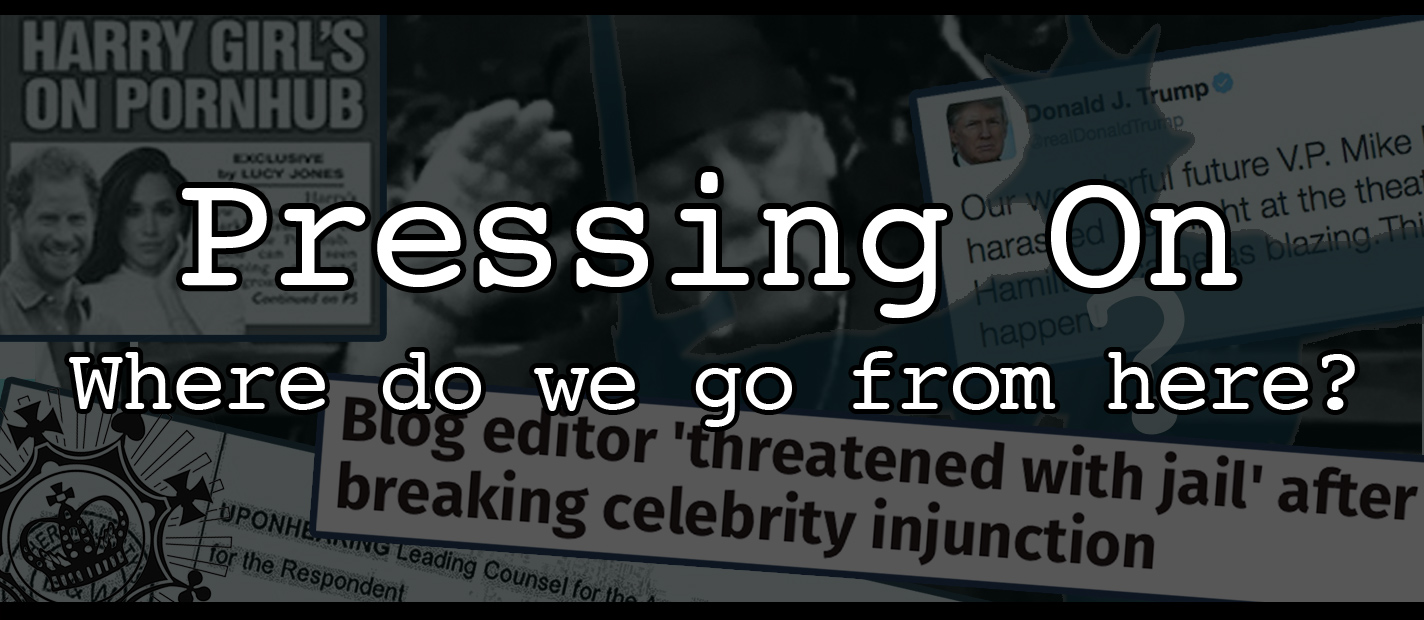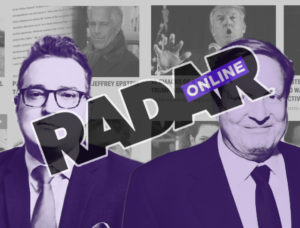Donald Trump. Donald Fucking Trump. Hoo boy, America! Buckle up…
Part IV: Post-Truth Will Out
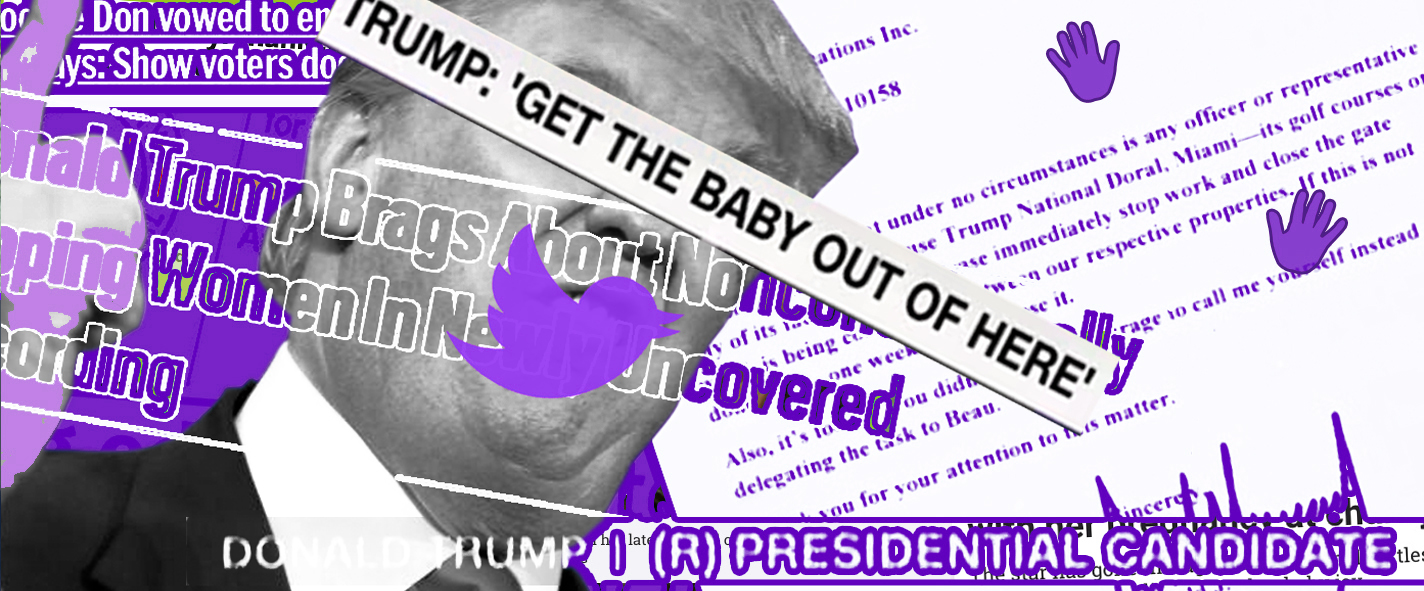

It’s fitting that, in a political era so obsessed with ‘optics’, Donald J Trump has already given us an absolutely perfect snapshot of how his administration intends to interpret the First Amendment.
And it’s even more fitting that it was with a tweet.
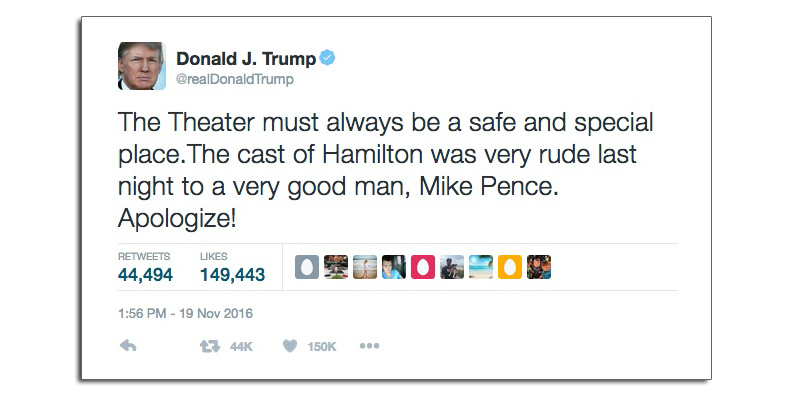
Indiana governor and Vice President-Elect, Mike Pence, has had to spend a lot more time in New York since he and Trump won the election. And what does an out-of-towner like Pence do when he’s in the Big Apple with a free evening and a bit of cash to spare? He goes to see Hamilton, of course!
A musical that has taken Broadway by storm, Hamilton is a show about the Founding Fathers and the birth of United States. More specifically, it is about Alexander Hamilton – the revolutionary gobshite who founded the US financial system, served as the country’s first Secretary of the Treasury and then got shot by the sitting Vice President for running his goddamned mouth.
The cast of the show is predominantly non-white, and the lead actor (Javier Muñoz, who plays Alexander Hamilton) is openly gay and openly HIV-positive.
Given that Mike Pence has advocated electroshock conversion therapy for LGBT teens, has cut funding for HIV research and treatment, and ran alongside Trump on a starkly anti-immigrant platform, the cast and crew of Hamilton felt obliged to take the chance to say something to him.
So they did. During the curtain call, Brandon Victor Dixon (the actor who played Vice President Aaron Burr) addressed Vice President-Elect Mike Pence in front of the audience, by saying:
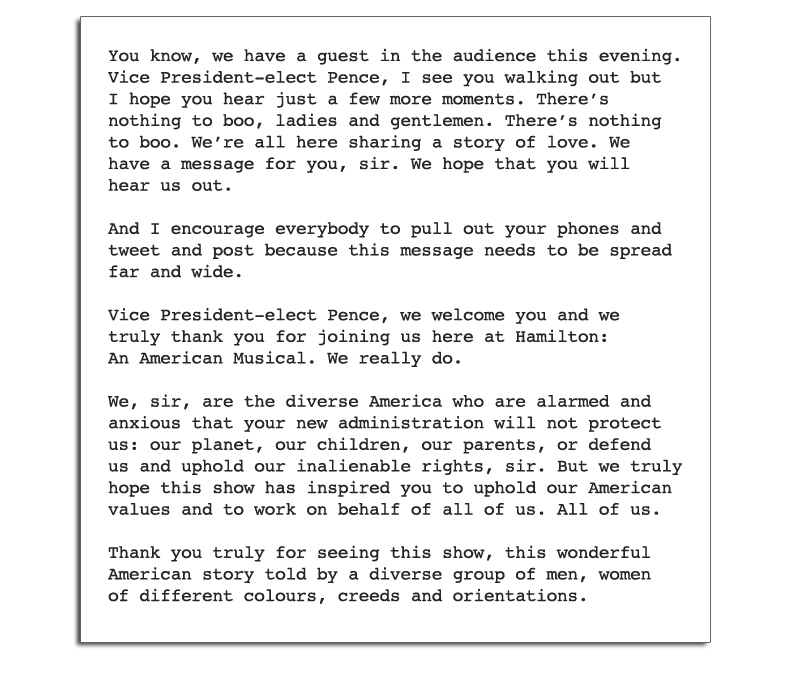
Now, you can debate the merits of actors indulging in this particular sort of political act if you want (it is something of a tradition in the theatre, although these speeches tend to stick in the craw of people who disagree) but there is no denying that the tenor of that short statement is respectful. It is pointed, yes, but it is respectful, polite and measured.
To Pence’s credit, he has since said that he wasn’t remotely offended by what the cast said to him. He described the experience as being “what freedom sounds like”.
So that should have been the end of it.
Except it wasn’t.
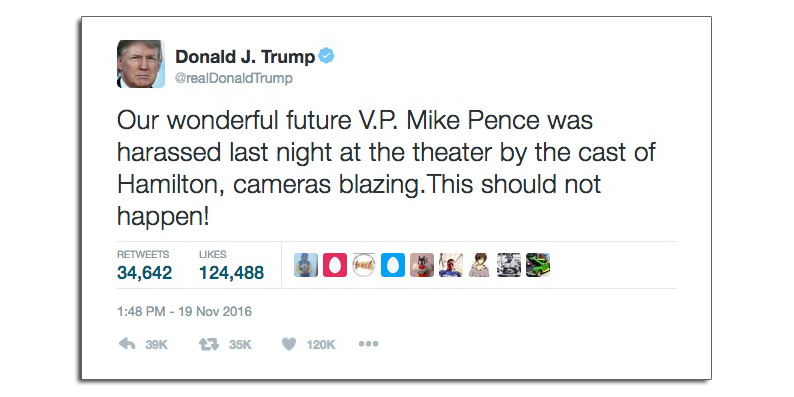
It takes a special sort of cloth-eared thumper to wade in to the middle of a cordial conversation and turn it into a fight, but that’s Trump for you.
This wasn’t just one of his little knee-jerk tweets either. He came back to it a full day later, seemingly uncooled.
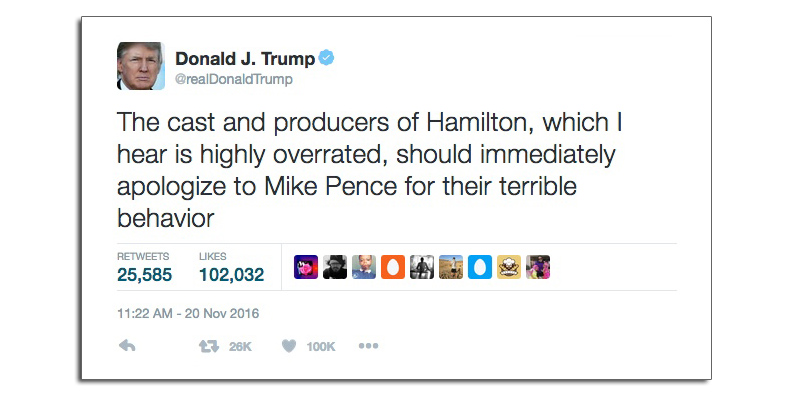
A lot of media commentators have been quick to chastise people for focusing too intently on this particular story, suggesting that it was a ‘distraction’, a deliberate ploy of Trump’s to deflect public attention from the fact that, at the same time, he:
– Settled a fraud case for $25m
– Was fined $1m by the State of New York for violating state education laws
– Has been inviting members of his family to sit in on official state meetings, and
– Has been using various state meetings and phonecalls to further Trump Organization businesses and interests, including allegedly arranging planning permits with the Argentinian president and attempting to block Scottish wind farms in a meeting with Nigel Farage.
Still, it’s important to take this Hamilton episode on board, if only because it’s probably going to be the clearest example of exactly how Donald Trump sees the First Amendment.
The rest is probably going to be a little more insidious – and we’ve already seen evidence of five major suppression tactics at play.

1/ Exclusion
Part of the reason the Hamilton story made so many headlines is that Donald Trump has taken the unprecedented step of ditching his press pool. Ordinarily, the White House press corps puts together a small band of reporters to cover the President (and, in times of transition, President Elect) who follow him around.
The point of having a skeletal press presence covering the Presidential whereabouts should be fairly self-evident, and it hopefully needn’t take too many moments of international calamity to make their purpose clear.
And yet Trump appears to be ducking them whenever he gets the chance.
The problem with that is that no-one really knows what he’s up to. Everything he’s doing is shrouded in mystery. For a President-Elect who has been on singularly shaky ground with truth, clarity and consistency, it is pretty imperative that external sources are on hand to be able to translate what is happening with PEOTUS (and even more so when he actually assumes office).
Up until now, Presidents-Elect have been fairly happy to invite the press to join them. Not Trump. The American press is now having to piece together stories from whatever alternate sources they can rustle up.
Partly that involves relying on foreign press agencies reporting back to them on what Trump has said to various international dignitaries (which is how it’s known that Ivanka was sitting in meetings; that Trump allegedly discussed planning permits with the Argentinian president)
Partly though, it also involves scrutinsing one of the only available channels of official communication from the man himself: Donald Trump’s Twitter feed.

2/ Intimidation
If you want a good example of the “chilling effect” that media commentators are constantly wringing their hands about, here’s a perfect one: Megyn Kelly.
Throughout the primary and presidential campaigns, Fox News’ Megyn Kelly was one of the reporters singled out by Trump. He repeatedly called her “sick”, “crazy”, a “bimbo” and – in one memorable instance – tried to imply that she was on her period because she asked him a probing question which delved into some of the more unflattering parts of his personal history.
This feud is widely thought to have have stemmed from a specific question that Kelly asked Trump in the first debate about his history of using slurs against women (calling them fat pigs, dogs, slobs etc). However, according to Kelly, this feud had a prelude. The week before, on her show The Kelly File, she ran a story about Donald’s divorce from Ivana Trump.
Trump was characteristically furious about it and had word sent to Kelly that she was to call him immediately. Kelly claims that he went ballistic on the phone when she refused to budge on her editorial stance, and says that he ended the call by telling her “I almost unleashed my beautiful Twitter account against you – and I still may.”
No surprises, that’s exactly what he did.
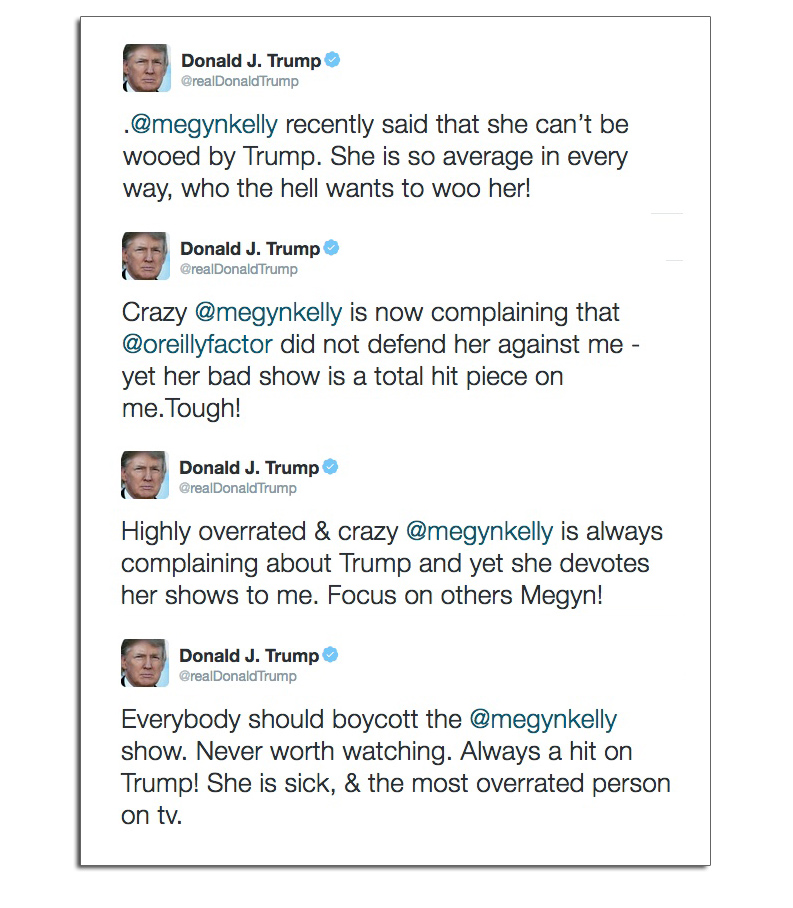
After the beef went national (thanks to Trump’s post-debate tweeting) swathes of Trump supporters soon descended on her. Through Twitter, through Reddit (in particular, a dedicated subreddit r/The_Donald), and through other online channels, they began making targeted threats.
Whether it was frivolous but professionally unhelpful trolling (like bombarding her Amazon listing page to pepper her with fraudulent one-star reviews); or, more seriously, a constant drip-drip of death and rape threats across social media – the bullying campaign lasted for the best part of a year.
The result? Megyn Kelly curled up. She lost her will to fight. Her priority shifted from holding the powerful to account to stemming the tide of abuse. She did what she to do to make it stop.
This isn’t us projecting on to Megyn Kelly. We aren’t putting words in her mouth. She pretty much said as much herself in an interview on US daytime chat show, The View.
The most illuminating part of the conversation comes when co-host Joy Behar tries to express her disappointment at Kelly not taking Trump to task about some of the vicious things he’s said. She had hoped that Kelly would take the chance to really grill him on his rhetoric – and this was Kelly’s response.
Megyn Kelly: What I was trying to do with the sit down at Trump Tower and the interview that followed, it was an off-ramp from a year of severe threats… I mean, real danger.
Joy Behar: So you didn’t want to confront him?
MK: I was looking to get him to stand down, Joy.
JB: OK. That’s fair.
Fair, maybe, for Megyn Kelly to not invite more harassment – but fair that a woman feels compelled to hire extra security because of Donald Trump’s petulant pant-pissing in the face of reasonable journalistic scrutiny?
Fair that a mother has cause to become afraid for her children’s welfare because of Donald Trump consciously set his army of Twitter trolls onto her?
Fair that a person who just wants to turn up at work and do her job without fear of being sexually harassed (more of which in a second) or subjected to a relentless onslaught of abuse from the internet’s dullest wits, is forced to compromise her integrity out of sheer fatigue from all the out-and-out bullying?
On reflection, that doesn’t feel very fair at all. It actually feels like it might be a little… unfair?
What happened to Megyn Kelly was a disgrace – and, worse, it was just a dry-run.
Trump is currently engaged in exactly the same sort of temper tantrum with the New York Times, and is once again using his Twitter feed as a bargaining chip to attempt to mould and control the type of coverage he receives.
Journalists should never be immune from criticism. We’re not saying they can’t be biased, or don’t deserve to be challenged on their motivations for pursuing certain lines of questions – but Megyn Kelly was asking serious, vital questions. The fact that they irked Trump should have been a reason to keep pressing. Instead, because too few colleagues stood up for Kelly that she felt sufficiently supported in the face of such widespread yet targeted abuse, she capitulated.
A journalist confessed that she chose not to confront Donald Trump on some points of contention because she was looking for a way to get him to calm down. A way to end her surreal year of bombardment. A way to make amends with the potential President. So she pulled her punches. She chose to play nice.
That is not fair.
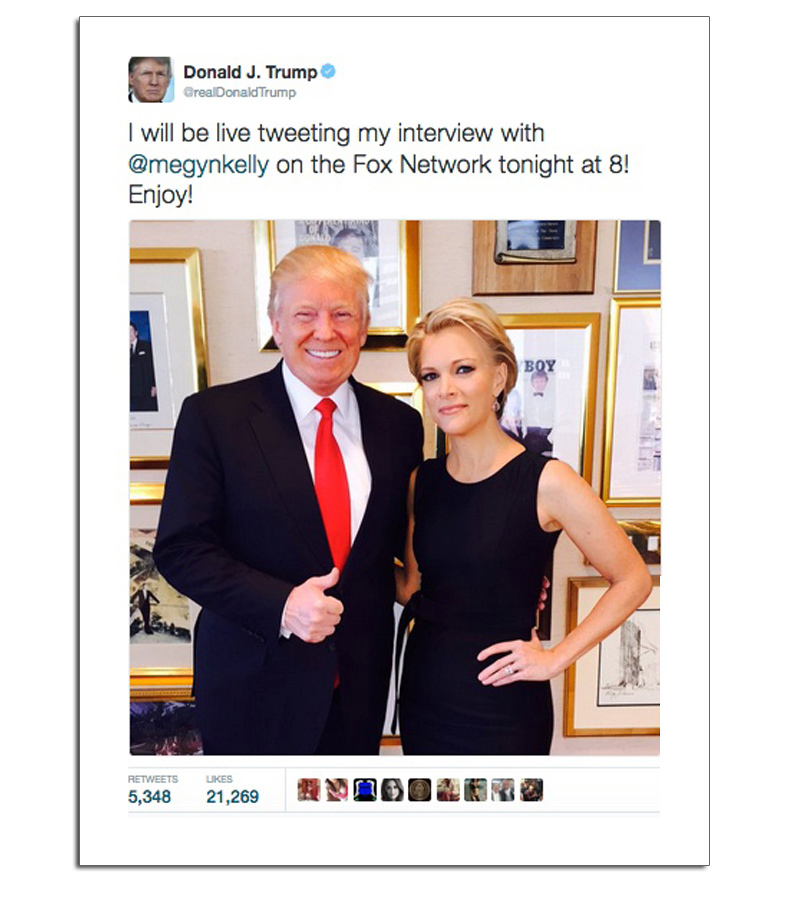
Trump enjoyed that interview, it won’t surprise you to learn.
 3/ Litigation
3/ Litigation
Maybe Megyn Kelly was right not to get too far on the wrong side of the Trump campaign because Trump’s extensive experience in litigation has proved to be useful in dealing with unfavourable press.
Trump himself is locked in legal battle with an unprecedented number of individuals and organisations – as are a number of his nearest advisors.
Roger Ailes – former president of Fox News (and erstwhile alleged sexual harasser of Megyn Kelly) – has New York Magazine on notice.
The brief story is that Ailes was let go from Fox News after Gretchen Carlson filed a lawsuit against the company, claiming that she had been fired for rejecting Ailes’ sexual advances. When a number of other former colleagues came forward with tales of his misconduct (according to the journalist who investigated, 18 women in total) Ailes position became completely untenable. He was shown the door.
The journalist who has been pushing hardest on this story is Gabriel Sherman. Sherman is the author of a biography of Ailes (The Loudest Voice In The Room) and a contributing editor for… New York Magazine.
Now that Ailes is part of Donald Trump’s inner circle, suddenly there are legal threats landing at Sherman’s desk – instructing New York Magazine to preserve all their documents pertaining to Ailes, in order to prepare for a possible defamation claim.
The signature at the bottom of that letter? Charles J Harder. The very same Charles J Harder, you may remember, who helped Hulk Hogan take down Gawker.
And Ailes isn’t Harder’s only new client either.
Melania Trump is currently suing the Daily Mail for speculating that she once worked as an escort. Looking to beat his current record of $140m in jury-awarded damages, Charles Harder has filed a suit on behalf of Melania claiming that the Mail’s careless accusation has damaged her standing to the tune of $150m.
To put this ludicrous figure into something approaching a context, eight months ago Harder was suggesting that publishing a video of Hulk Hogan engaged in actual, physical sexual penetration was worth an estimated $100m in damages.
To put a price tag of $150m for a simple (if stupid) accusation of soliciting therefore seems a little steep.
This is the future First Lady of the United States we’re talking about here. Her reputation has not suffered one jot as a result of this reporting. She is fine. She will continue to be fine. This is a powerplay, as pure and simple as they come, telling people to back off Melania Trump or face financial ruin.
But perhaps most notable of all the members of Team Trump to be firing off lawsuits is Steve Bannon. The former Breitbart News chairman and senior strategist of the Trump administration, Bannon has non-specifically threatened to sue a “major media organisation” for describing him as a ‘white nationalist’.
This is a clear bit of posturing for a few reasons.
Bannon has proudly claimed that Breitbart is a natural platform for the alt-right (which is, if not exactly white nationalist, a razor’s breadth from being white nationalist).
It doesn’t help his case that alt-right founder Richard Spencer was filmed reading Nazi propaganda in the original German and encouraging Heil Trump salutes at a DC rally last week, but beyond that Bannon has published a number of deliberately provocative articles. The site also boasts a comments section that reads like a transcription service for hard-of-hearing Klan members.
In short, Breitbart – intentionally, or otherwise – is a writhing hive of white nationalist activity and Steve Bannon will be only too aware of that.
But note how he is threatening to sue a “major media organisation”. This trick has echoes of Trump’s threats in the campaign to sue all of the women who came forward with claims of sexual assault. It’s not done because Trump was keen to start legal proceedings in a dozen different directions; nor because he thinks he had much of a case. It was to paralyse anyone further from coming forward.
Similarly with Bannon’s strangely open-ended threat, media organisations now think twice about branding him a ‘white nationalist’ – choosing instead to refer to him as merely a ‘firebrand’, a ‘provocateur’ or ‘controversial figure’.
Breitbart is useful too because it demonstrates another line of attack on the free press.

4/ Disruption
Remember Corey Lewandowski? He was Trump’s original campaign manager – back before Kellyanne Conway, before Steve Bannon, before Paul Manafort.
Lewandowski was let go from the Trump campaign in June 2016. His position had become untenable, in large part due to the fallout from an alleged incident that took place in March between Lewandowski and a press reporter covering a Trump event, Michelle Fields.
Fields alleged that Lewandowski “forcibly yanked” her out of Trump’s way at a press conference. Despite there being video footage of the incident taking place, this is what Trump’s main players had to say about it:
Corey Lewandowski (campaign manager): “I would have remembered if I had tried to violently throw someone to the ground or if there were an incident that would have been memorable. And there wasn’t.”
Hope Hicks (spokesperson): ”The accusation, which has only been made in the media and never addressed directly with the campaign, is entirely false.”
Donald Trump (host body): “Nobody saw it happen. Nobody complained. Perhaps she made the story up. I think that’s what happened.”
Here’s the curious bit. Michelle Fields was a reporter for Breitbart. The publication that would later be credited with aiding his rise. The publication that would soon provide Trump with his campaign chief executive.
In all the hullabaloo there has been to remind people that Steve Bannon published an alt-right website, it is being lost to the mists of history that Trump started off his campaign by calling the reporters of Breitbart liars, fantasists and biased. Yet that’s how it started – and now Breitbart’s head guy is all primed to become a senior White House advisor.
This hot-and-cold relationship with Breitbart neatly demonstrates the disruptive streak at their heart of the Trump strategy. It helps to muddle up the order of things. It sows seeds of doubt in the mind of the public. It keeps reporters at Breitbart on their toes. Things might seem gravy while their boss has the ear of the big man, but what’s to stop Trump from turning on them the way he turned on Michelle Fields?
The uncertainty, the chaos – it helps to foster a distrust of the media. This, in turn, drives them to pay further attention to Trump’s own channels of communication: his interviews, his video addresses, his Twitter feed.
Fields stood down from Breitbart, claiming that Breitbart had failed to support her during the whole ordeal (sound familiar?).
As for Lewandowski? He may have been fired as Trump’s campaign manager, but you know what they say: you can’t keep a good man down.

5/ Infiltration
On June 23rd, just 72 hours after being handed his papers by the Trump campaign, Corey Lewandowski became an analyst for CNN.
Anyone expecting him to have been soured by his experience of being fired by Trump was in for a shock. Lewandowski was still full of beans and gave some impressively positive spin to a number of Trump mishaps.
What could have caused him to stay so chipper so soon after having been sacked? Could it be – could it possibly be – that Lewandowski’s consulting firm Green Monster was being paid $20,000 a month by the Trump campaign while he was appearing on CNN?
The money was explained away as severance pay, settled month on month, but quite why he was spotted being snuck out of Trump’s private campaign plane in mid October is still a bit of a headscratcher.
Then, on November 10th – just two days after Trump won the election – Lewandowski announced that he would be leaving CNN.
Before promptly taking a meeting at Trump Tower.
(CNN, it’s also worth mentioning, was a network that Trump perpetually referred to as the Clinton News Network throughout the campaign – claiming it was a mouthpiece for the Clinton campaign, even though for a lot of that time his ex-campaign manager was a fixture on their talking head slots – further spreading disruption and confusion)
Lewandowski and Bannon aren’t the only two people in Trump’s close quarters who have serious media influence. Arguably the most influential of all is Jared Kushner.
Jared Kushner is probably best known as being Donald Trump’s son-in-law, the husband of Ivanka. He is also known for being one of Donald Trump’s most trusted advisors, and generally considered to be the tactical brains of the Trump/Pence campaign.
One of things that Jared Kushner is less well known for being is the owner and publisher of the New York Observer.
The Observer was notable for being one of the very few publications that came out and endorsed Trump over the election cycle (alongside the KKK’s in-house periodical, The Crusader) – but it was not a hugely surprising, given Kushner’s ties to the campaign.
And how are Kushner’s ties helping now that the election has been won and negative speculation is circling about Steve Bannon’s appointment as senior advisor, former Grand Wizard David Duke getting jazzed about Trump’s cabinet picks, and alt-right rallies in DC shouting Hail Trump?
Like this:
